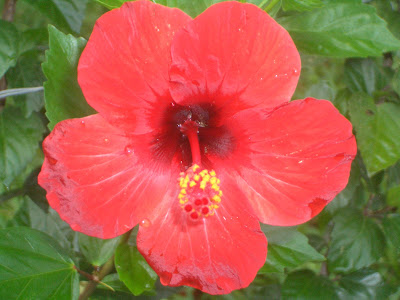Well I have fallen behind in my quest to document part of our Tanzanian stay, but that is consistent with life in Africa. Don’t worry, it will all be fine (hankuna matata).
Our daily walk brings us by the wonderful tree each morning and evening.
After less than one week here, Bill left for a one-day meeting in Berkeley, CA, which was in his view successful, albeit 40 hours on the ground and 50+ hours in transit. The real proof of success will be measured in his future funding potential from NNSA. [If you don’t know, you don’t need to know.] While Bill was gallivanting, Roberta was enjoying the pure and unadulterated pleasures of having a broken laptop in Africa. It gets no worse than that, I tell you. The e-mail pleas to Bill, and then to Todd and Phil (the go to dept-saviors who really know computers) came fast and furious. Nothing was working and Roberta was getting desperate.
Friday night meant the arrival back in Dar for Bill, which included a pleasurably brief 17-minute ride from airport to residence (ah, what a contrast with the “to” journey) followed by a “hi, I love you. Have I told you about my computer!!!!” Yup, the kisses were short lived and the stories of woe were not. This is the century of computer addiction and we are all victims. Later, I’ll tell you about the Trojan-Windows PC in our office, which is more like a gift that the North Korean’s might give to their southern neighbors. ;-)
The weekend had a mixture of the usual and different. We enjoyed our walking to and shopping at Mlimani Center, about a 30-minute walk from our flats through the campus. Mlimani Center reminds us a bit of Prince Georges Plaza, with 1/3 the number of shops. Notably we always have to visit by the ATM, as most shops require cash (no credit card option). There’s nothing like the feeling of 200-400 thousand Tanzanian schillings in your pocket to make you feel like a big spender!

Sunday was our first venture into the heart of Dar. We checked out the National Museum of History (pictured above), which is downtown and cleverly hidden behind corrugated metal walls with an obscure red, hand-painted sign identifying the Museum inside. True to the guidebook it was worth the visit. Lots of history including background on the 500+ years of trading in this part of the Indian Ocean between India, the Arab world and the eastern coast of Africa, with Zanzibar being the focal point for the African region. Background on the 19th century explorers, German rule, up to World War 1, and the British Colonial period, up to 1964 were on display, complete with tales of killings and enslavement of the people. We were struck by the silly German and British leaders in various settings always wearing an abundance of formal clothes – how did they ever avoid heat stroke? The story of the presidency of Julius Neyrere (the first head of state for some 20+ yrs) and the formation of the United Republic of Tanzania, which specifically includes Zanzibar and its government, was fascinating and, upon reflection, a success. I conclude this, given all of the neighboring countries and the tumultuous internal struggles these other countries have had with respect to tribal rivalries. The museum also had various cultural highlights, AIDS and prehistory displays, including Olduvai Gorge and Laetoli (the famous early man footprints in volcanic ash) and a relatively muted coverage of the country’s magnificent diversity of animals and landscapes. One of the last things we saw at the museum was the memorial to the 11 victims of the 1998 bombing of the US Embassy in Tanzania (shown below). It was a poignant and moving display destroyed bicycles, vehicle parts, a shattered embassy window and a sculpture of an armless person.

Seeking relief from the heat and needing lunch we left the museum and headed off on a hunting and gathering expedition. A bit of aimless wondering brought us to one of the fancier Mzungu-hotels (white people hotels) where we enjoyed a rather pricy buffet that had plenty on offer. After lunch we strolled around the waterfront and ended up in the botanic gardens, which had some beautiful specimens, but is overall a bit sad in terms of upkeep. There we met Richard, who claimed to be interning at the gardens, a refugee from Burundi, had lost his parents to genocide, had malaria, had to sell the mobile phone given to him by a missionary to pay for medications, and please, could you help out (this request after we walked about the garden and he told us “interesting” stories, which turned out to be figments of his imagination -- at least, as far as we can tell). Anyway, it was a good story, so Bill gave him 3000 TZS when we left.
The week was full of ups and downs. There was the computer saga… Roberta’s MacBook Air is not dead, but is worse than limping. After having problems in Italy and China, Roberta scheduled a complete disk reformatting and rebuild by Todd (at UMD, between China and TZ travels), with the Air coming back to its old self as we left for TZ. However, a week into TZ it started slowing down to the point of being unusable. Faced with the potential of lots of delays (by that time we still had not received any of our “express-sent” packages from Italy or the States) Roberta began using the Windows desktop that was lying idle in our office. Now we know why it was lying around. We won’t call it the PC from hell, but its application is pending.





































